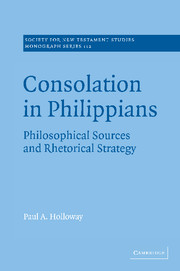Book contents
- Frontmatter
- Contents
- Acknowledgments
- Abbreviations
- Introduction
- Part I Literary and rhetorical contexts
- Part II Consolation in Philippians
- 4 Paul's consolatory strategy: discerning the things that matter (Phil. 1:3–11)
- 5 Discerning the things that matter in the gospel mission (Phil. 1:12–2:30)
- 6 Discerning the one thing that matters in the Christian life (Phil. 3:1–4:1)
- 7 Concluding parenesis, consolation, and thank-you note (Phil. 4:2–23)
- Conclusion: an analysis of Philippians
- Bibliography
- Index of modern authors
- Index of passages cited
6 - Discerning the one thing that matters in the Christian life (Phil. 3:1–4:1)
Published online by Cambridge University Press: 06 October 2009
- Frontmatter
- Contents
- Acknowledgments
- Abbreviations
- Introduction
- Part I Literary and rhetorical contexts
- Part II Consolation in Philippians
- 4 Paul's consolatory strategy: discerning the things that matter (Phil. 1:3–11)
- 5 Discerning the things that matter in the gospel mission (Phil. 1:12–2:30)
- 6 Discerning the one thing that matters in the Christian life (Phil. 3:1–4:1)
- 7 Concluding parenesis, consolation, and thank-you note (Phil. 4:2–23)
- Conclusion: an analysis of Philippians
- Bibliography
- Index of modern authors
- Index of passages cited
Summary
Believe me, real joy is a matter of the utmost importance.
Seneca, Ep. 23.4With the command to “rejoice in the Lord” in Phil. 3:1a, Paul returns to the theme of “the things that matter,” things that may legitimately be made the object of one's joy, and introduces the second heading of his letter (3:1–4:1). He has so far instructed the Philippians in the things that matter relative to the gospel mission, namely, the “progress” (πρoκoπή) of the gospel message and the “boldness” (παρρησíα) of the gospel messenger (1:12–2:30). But he has more to say on this topic, and in 3:1–4:1 he takes up the question of what matters relative to one's Christian existence as such. Here the proper object of joy is not the proclamation of Christ (cf. 1:18b: Xριστòς καταγγλέλεται καì ἐυ τούτῳ χαíρω), but Christ himself (cf. 3:1a: χαíρετε ἐυ κυρίῳ). Paul thus moves in the second part of his letter from penultimate to ultimate concerns, or, to continue with the theme announced in 1:10a, from the things (plural) that matter to the “one thing” (ἕν) that matters most: “the surpassing greatness of the knowledge of Christ” in comparison to which all else is “refuse.” In Christ, Paul offers the Philippians a source of joy that is altogether independent of the measurable successes of the gospel mission.
- Type
- Chapter
- Information
- Consolation in PhilippiansPhilosophical Sources and Rhetorical Strategy, pp. 130 - 145Publisher: Cambridge University PressPrint publication year: 2001

